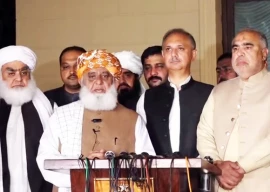
Singer Haroon Rashid (former member or Awaz) and a number of other musicians from Islamabad recently came together to make an anti-piracy song titled Maza Muft Ka. The message of the song is as pertinent as Haroon is now to the Pakistani music industry. It seems more like a desperate attempt on his part to sustain his own relevance rather than a genuine effort to shed light on an issue, or should we say, a non-issue?
The English subtitles of parts of the song say, “On the outside it seems all hunky-dory, but something isn’t right here. Wish people would think twice, how hunger kills the artiste’s muse,” and “You listened to songs that fed your soul, but never gave a thought at all. Someone put their heart into this tune, they did the hard work and you reaped the reward.”
Not only does Haroon’s song fail to make a statement from a rational perspective, but also relies needlessly on gaining sympathy from the audience regarding artistes’ efforts. Not to mention, the badly produced audio and video makes it even harder to commend the song for the intent behind it. He and all the other artistes who ruminate over piracy in the music industry need to do some soul-searching.

One might get taken aback by how piracy is no longer applicable to the local music industry. The draconian deals offered by record labels in Pakistan (and many other countries), especially in the post-Indus Music days, have facilitated artistes less and marginalised them more. Record Labels consumed the lion’s share of the revenue, which is why if piracy ever affected anyone, then it is the labels themselves.
Let’s look at the mid-90s when an artiste used to get royalty worth Rs1 on a cassette priced around Rs15 to Rs20, a rate that was later on improved to Rs3 for a cassette worth Rs30 to Rs35, and Rs15 for a CD worth Rs60 to Rs70. On paper, it sounds like a fair deal, but what happens when there is no way of judging the actual sales of an artiste’s album? Well, nothing really. The artiste starts looking for live concerts and brand endorsements.
“You would be surprised to know that after our first album, Vital Signs was broke because we didn’t get a single penny as royalty from EMI Pakistan. Had Pepsi not come to our rescue, there would have been no more albums,” Rohail Hyatt told The Express Tribune in an interview conducted earlier. EMI, however, still claims that they send royalties to the band.
Musician-turned-politician Abrarul Haq, whose album Billo is still considered as the most widely sold album, had to face similar problems. “I got Rs0.3 million as royalty for Billo whereas my share was around Rs10 million and the rest was taken up by my record label,” Abrar said. “I have always relied on live shows for my living as a musician and so have others. Piracy is a bad thing, but it really didn’t affect the artistes as such,” he added.

As time passed by, piracy became more irrelevant to most musicians as better platforms of earning money surfaced, but the labels didn’t do anything to offer artistes better deals. A more recent example is band Entity Paradigm’s (EP) cover of Sajjad Ali’s Bolo Bolo in Coke Studio. The song was performed out of mere compulsion as EP’s record deal didn’t allow its released music to be performed without a significant share of the return.
This was also the time when websites such as apnisp.com became the online reservoirs of fresh music. Platforms like grooveshark.com and SoundCloud have also come as a welcome change for musicians willing to share their music with the world. Such websites have been comfortably accepted as release mediums from artistes all over the world.
In fact, most of the songs on these websites were provided by musicians themselves who were usually unhappy with the limited distribution network and laid-back approach of their record label. To counter the unimpressive deals offered by record labels, some artistes even came up with their own labels, but that attempt mainly failed due to a lack of distribution network.
Today, the ‘smart’ musicians are releasing videos instead of albums or simply uploading soundtracks online. Even if they are unable to reap monetary benefits, they lose nothing as the public’s verdict is sufficient to please or displease them. The international record labels, however, continue to send royalties to artistes, which is why both Shafqat Amanat Ali and the present members of Fuzön still receive monthly royalties for their debut album Saagar.
In recent times, Ali Gul Pir has performed live more than many other artistes due to a few of his viral videos, which are free for all to view. The memes and other pirated material that surfaced worked in his favour. This brings us to the Kholo BC campaign, which highlights a far more relevant issue (indefinite ban of YouTube in the country) in a direct and catchy way. The ban on YouTube has ripped musicians off the easiest distribution network. If the ban is lifted, then we can all expect to see an influx of fresh Pakistani music.

So, in 2014 when the music landscape has changed so much, a song like Maza Muft Ka falls short. If Haroon is really concerned about the music industry, then he should try and make a song against the record labels, which he obviously won’t. After all, major record labels are owned by major media groups and EMI Pakistan, which is the only prominent independent label, is no longer launching new artistes.
Published in The Express Tribune, May 16th, 2014.
Like Life & Style on Facebook, follow @ETLifeandStyle on Twitter for the latest in fashion, gossip and entertainment.



1730788481-0/BeFunky-collage-(19)1730788481-0-165x106.webp)


1730786905-0/£300,000-(1)1730786905-0.png)








1730706072-0/Copy-of-Untitled-(2)1730706072-0-270x192.webp)
COMMENTS
Comments are moderated and generally will be posted if they are on-topic and not abusive.
For more information, please see our Comments FAQ